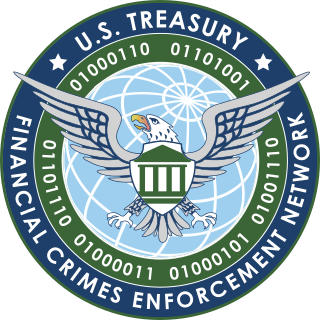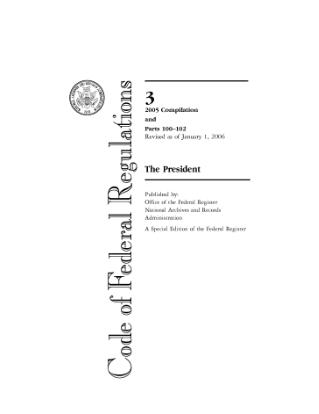
The Department of the Treasury (USDT) is the national treasury and finance department of the federal government of the United States, where it serves as an executive department. The department oversees the Bureau of Engraving and Printing and the U.S. Mint. These two agencies are responsible for printing all paper currency and coins, while the treasury executes its circulation in the domestic fiscal system. The USDT collects all federal taxes through the Internal Revenue Service; manages U.S. government debt instruments; licenses and supervises banks and thrift institutions; and advises the legislative and executive branches on matters of fiscal policy. The department is administered by the secretary of the treasury, who is a member of the Cabinet. The treasurer of the United States has limited statutory duties, but advises the Secretary on various matters such as coinage and currency production. Signatures of both officials appear on all Federal Reserve notes.

The Financial Crimes Enforcement Network (FinCEN) is a bureau of the United States Department of the Treasury that collects and analyzes information about financial transactions in order to combat domestic and international money laundering, terrorist financing, and other financial crimes.

The Bank Secrecy Act of 1970 (BSA), also known as the Currency and Foreign Transactions Reporting Act, is a U.S. law requiring financial institutions in the United States to assist U.S. government agencies in detecting and preventing money laundering. Specifically, the act requires financial institutions to keep records of cash purchases of negotiable instruments, file reports if the daily aggregate exceeds $10,000, and report suspicious activity that may signify money laundering, tax evasion, or other criminal activities.

In the law of the United States, the Code of Federal Regulations (CFR) is the codification of the general and permanent regulations promulgated by the executive departments and agencies of the federal government of the United States. The CFR is divided into 50 titles that represent broad areas subject to federal regulation.

The Truth in Lending Act (TILA) of 1968 is a United States federal law designed to promote the informed use of consumer credit, by requiring disclosures about its terms and cost to standardize the manner in which costs associated with borrowing are calculated and disclosed.

The United States Federal Maritime Commission (FMC) is an independent federal agency based in Washington, D.C. that is responsible for the regulation of oceanborne international transportation of the U.S. It is chaired by Daniel B. Maffei.
The USA PATRIOT Act was passed by the United States Congress in 2001 as a response to the September 11, 2001 attacks. It has ten titles, each containing numerous sections. Title III: International Money Laundering Abatement and Financial Anti-Terrorism Act of 2001 is actually an act of Congress in its own right as well as being a title of the USA PATRIOT Act, and is intended to facilitate the prevention, detection and prosecution of international money laundering and the financing of terrorism. The title's sections primarily amend portions of the Money Laundering Control Act of 1986 and the Bank Secrecy Act of 1970.
The USA PATRIOT Act was passed by the United States Congress in 2001 as a response to the September 11 attacks in 2001. It has ten titles, with the third title written to prevent, detect, and prosecute international money laundering and the financing of terrorism.
Bank regulation in the United States is highly fragmented compared with other G10 countries, where most countries have only one bank regulator. In the U.S., banking is regulated at both the federal and state level. Depending on the type of charter a banking organization has and on its organizational structure, it may be subject to numerous federal and state banking regulations. Apart from the bank regulatory agencies the U.S. maintains separate securities, commodities, and insurance regulatory agencies at the federal and state level, unlike Japan and the United Kingdom. Bank examiners are generally employed to supervise banks and to ensure compliance with regulations.
CFR Title 50 - Wildlife and Fisheries is one of fifty titles comprising the United States Code of Federal Regulations (CFR). Title 50 is the principal set of rules and regulations issued by federal agencies of the United States regarding wildlife and fisheries. Maintained by the Office of the Federal Register, it is available in digital and printed form, and can be referenced online the Electronic Code of Federal Regulations (e-CFR).
CFR Title 49 - Transportation is one of fifty titles comprising the United States Code of Federal Regulations (CFR). Title 49 is the principal set of rules and regulations issued by the Departments of Transportation and Homeland Security, federal agencies of the United States regarding transportation and transportation-related security. This title is available in digital and printed form, and can be referenced online using the Electronic Code of Federal Regulations (e-CFR).
CFR Title 3 – The President is one of 50 titles composing the United States Code of Federal Regulations (CFR) and contains the principal set of rules and regulations issued by federal agencies regarding the Executive Office of the President of the United States. It is available in digital and printed form and can be referenced online using the Electronic Code of Federal Regulations (e-CFR).
CFR Title 34 - Education is one of fifty titles comprising the United States Code of Federal Regulations (CFR). Title 34 is the principal set of rules and regulations issued by federal agencies of the United States regarding education. It is available in digital and printed form, and can be referenced online using the Electronic Code of Federal Regulations (e-CFR).
CFR Title 32 – National Defense is one of 50 titles composing the United States Code of Federal Regulations (CFR). Title 32 is the principal set of rules and regulations issued by federal agencies of the United States regarding national defense. It is available in digital and printed form and can be referenced online using the Electronic Code of Federal Regulations (e-CFR).
CFR Title 29 - Labor is one of fifty titles comprising the United States Code of Federal Regulations (CFR), containing the principal set of rules and regulations issued by federal agencies regarding labor. It is available in digital and printed form, and can be referenced online using the Electronic Code of Federal Regulations (e-CFR).
CFR Title 28 - Judicial Administration is one of fifty titles comprising the United States Code of Federal Regulations (CFR), containing the principal set of rules and regulations issued by federal agencies regarding judicial administration. It is available in digital and printed form, and can be referenced online using the Electronic Code of Federal Regulations (e-CFR).
CFR Title 20 – Employees' Benefits is one of 50 titles composing the United States Code of Federal Regulations (CFR) and contains the principal set of rules and regulations issued by federal agencies regarding employees' benefits. It is available in digital and printed form and can be referenced online using the Electronic Code of Federal Regulations (e-CFR).
CFR Title 12 – Banks and Banking is one of 50 titles composing the United States Code of Federal Regulations (CFR) and contains the principal set of rules and regulations issued by federal agencies regarding banks and banking. It is available in digital and printed form and can be referenced online using the Electronic Code of Federal Regulations (e-CFR).
CFR Title 8 – Aliens and Nationality is one of fifty titles composing the United States Code of Federal Regulations (CFR), containing the principal set of rules and regulations issued by federal agencies regarding aliens and nationality. It is available in digital and printed form, and can be referenced online using the Electronic Code of Federal Regulations (e-CFR).
CFR Title 5 – Administrative Personnel is one of fifty titles comprising the United States Code of Federal Regulations (CFR), containing the principal set of rules and regulations issued by federal agencies regarding administrative personnel. It is available in digital and printed form, and can be referenced online using the Electronic Code of Federal Regulations (e-CFR).